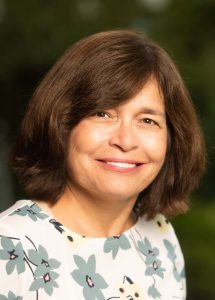The new BSN program director at Southern Connecticut State University, Maria Krol, has witnessed life at its most fragile. But Associate Professor of Nursing Krol, who has been a nurse for almost 30 years in the field of maternal child health — and in the neonatal intensive care unit — has seen some of those dire cases grow into the most healthful, and she plans to bring the knowledge, strength, and humanness needed to navigate those situations to her new role.
“I’ve been a nurse since 1990,” Krol said. “In the NICU, I always feel that parents are so courageous and that babies have such a battle. Sometimes we think it’s going to be the worst outcome, but they end up having the best life. Being able to help and give parents the ability to take home their babies is an honor.”
At the same time, she acknowledged that it isn’t always easy.
“When you think your life is bad,” she said, “you see these babies who have to undergo so much.” The parents, doctors, and nurses who care for those babies in critical condition undergo their own trauma as well and Krol is frank when people tell her, “I couldn’t do that.”
“It’s true, not everyone could do it,” she said. “There’s a lot to being a nurse. I’m current in my nursing practice. It makes me a better educator.”
Krol was born in Peru and has lived in the United States for more than 30 years. She began her nursing career at Bridgeport Hospital School of Nursing in the 1990s, and then her teaching career at BHSN in 2006. She knew from the beginning that the field of maternal child health was where she wanted to be, in a most-encompassing way: She didn’t just want to care for babies but rather, she wanted to help families learn the best way to care for those babies.
“When the nurse lets a family participate in care, you help parents gain confidence and trust themselves,” she said. “They touch and care differently. The babies grow and heal differently.”
She started teaching at Southern in 2012 and now works as a nurse at Stamford Hospital, where she has been for 17 years. It was there, in Stamford, that Krol’s work in the NICU took on extra urgency. The city recorded more than 2,300 cases of COVID-19 — the highest in Connecticut — and some of those cases were new mothers.
“For any pregnant woman who was positive, the baby went to NICU right away,” Krol said. “Was it scary? Yes. But does it stop us from going to work? No. These babies are separated from their parents, and no one else can visit. It was up to us, the nurses, to provide loving care to our tiny patients being affected by this virus.”
To Krol, the COVID-19 pandemic exposed society not just to the sad realities of the illness, but to troubling inequalities in the healthcare system.
“More and more, you see the disparity in healthcare with minorities,” Krol said. “One of things people don’t understand is that some people have to choose between feeding their families and possibly infecting their families because they can’t work from home. COVID has brought a light that there are health disparities. We need to address that. We can’t go on thinking that we’re a nation that provides equity when we don’t even provide health equity.”
More specifically, Krol feels that the field of nursing, too, suffers from imbalances.
“While I’m grateful for the free lunches and gratitude, nursing has a lot of problems and COVID has shown the light on how nurses are treated in hospitals and how important it is for us to advocate for nurses,” Krol said. “And Latinos are less than 10 percent of the nurses in the workforce. I want to bring them to Southern, where they can see themselves in this role.”
As a teacher and nurse and now, as BSN director in the nursing program, she has been and will continue to advocate for just that.
“Ten years ago, I started a National Association of Hispanic Nurses chapter at Bridgeport [Hospital School of Nursing], while working there, encouraging students to join,” she said. “When I came to Southern, I started a student chapter, but this year I encouraged students to select a title that was much more diverse. We needed to be more inclusive. This year we are the Multicultural Healthcare Leaders. I want there to be representation.”
An incident that stands out to Krol is particularly telling of her capabilities both within the hospital and the classroom. In the early 2000s, she was able to visit a NICU baby who had been in her care months earlier. In the NICU, the newborn hadn’t been able to breathe independently; he was inflated by high calories and steroids so he would have the protein needed to breathe. It was a difficult sight to see, but within six months of being home, he was sitting up on his own.
“It was so rewarding,” Krol said. “Every time I take care of a baby, I feel like I’m helping a family get there. So they can achieve on their own. So they don’t need my help anymore.”
In Krol’s new role, that same philosophy — of helping one grow and achieve — will continue to inspire nursing students for years to come.
Dr. Maria Krol is president and founder of the Connecticut Chapter of the National Association of Hispanic Nurses; a member of the National Engagement Committee; President of the MuBeta Chapter of the Sigma Theta Tau International Honor Society of Nursing; a member of the President’s Commission on Social Justice-Recognition Committee; and Advisor to the Multicultural Healthcare Leaders.



